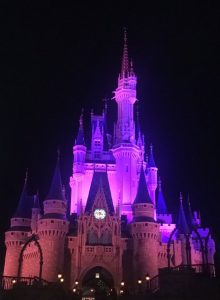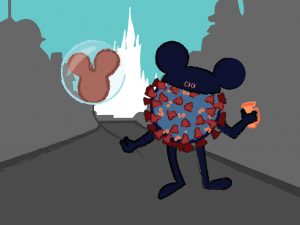
COMMENTARY: Reopening Disney World was a poor choice
Walt Disney World Resort’s Magic Kingdom and Animal Kingdom officially reopened July 10 amid the rise of COVID-19 cases in Florida. All parks are open to the public as of July 15. Amusement parks in Texas like Six Flags, Schlitterbahn, Kemah Boardwalk and Pleasure Pier opened in June.
There is backlash over Disney World’s decision to reopen the parks because of the rising number of cases, prompting accusations of (the company’s) greed. The backlash is justified because Disney is putting employees at risk and encouraging people to travel to Florida, a state among those with the highest number of COVID-19 cases in the United States. While the general public is criticizing Disney World, Texans should criticize the amusement parks (Pleasure Pier, Schlitterbahn and Six Flags) in Texas that reopened before Disney World. The same criticism for Disney World should be applied to all amusement parks.

Disney World is the last major amusement park to reopen in the Orlando area. Universal Orlando Resort reopened June 5, more than a month earlier. Both amusement parks reopening is encouraging families out-of-state to travel to Florida, where case numbers are rising. This will contribute to more COVID-19 cases and potentially a reclosing if people are not responsible for themselves or others by not following the guidelines set forth.
The backlash worsened when Disney Parks and Resorts released a ‘Welcome home’ video. People online accused Disney World of being money hungry and putting their ‘cast members’ at risk. Others say they should provide testing to employees and pay cast members hazard pay in addition to the masks and face-shields provided.
Walt Disney World Resort is a business and in order to stay afloat, they need to make money. Reopening the parks is one way to make money. However, there is a risk in forcing people to return to work. Opening up could lead to more backlash if employees and/or guests get sick or health and safety precautions are not followed. They already cancelled college programs. More backlash will happen when areas of the parks are understaffed and cast members are working longer hours than usual. This possibility will be furthered following the cancellation of college programs, areas of the parks will be understaffed and cast members will be working longer hours than usual.
With the announcement of Disney World reopening, the Walt Disney World website laid out health guidelines for their return. Guests with valid admissions must make a reservation prior to visiting a park. Park reservations are through the Disney Park Pass reservation system. Face coverings are required for everyone two years and older with temperature screenings at points of entry. Disney also announced some hotels, restaurants, attractions and experiences (shows, parades, fireworks) may be modified, limited capacity, limited availability or closed based on advice from health and government experts. These precautions are similar to those of other amusement parks.
As Disney World reopens, Hong Kong Disneyland announced they were shutting down again July 15 after reopening in June. The resort hotels are staying open with more health and safety measures that reflect guidance from health and government authorities. Hong Kong has 2,250 confirmed cases of COVID-19 as of July 23 while Orange County (where part of Disney World is located), Florida has 25,254 confirmed cases as of July 23. If Hong Kong Disneyland is shutting down again because of the rise in cases, this should be a lesson for Disney World and other theme parks in America.
As Disney World is in the spotlight, Texas amusement parks like Kemah Boardwalk, Pleasure Pier, Six Flags and Schlitterbahn reopened before Disney World. The number of cases in Galveston country (where the three amusement parks are located) is 7,479 as of July 23. Schlitterbahn Galveston and New Braunfels reopened on June 13 to season-pass holders only. Now, it is operating on a reservation system where guests must schedule a time to visit. Schlitterbahn also announced health and temperature screenings for all guests and employees, hand washing and sanitation stations around the park and designated face-covering areas.

Kemah Boardwalk and Pleasure Pier reopened their attractions June 5. Their parent company, Landry’s, Inc. laid out preventative measures similar to Disney World and Schlitterbahn – social distancing, employee screenings (temperature checks, face masks), dining enhancements (disposable menus, no-touch menus) and enhanced sanitation and cleaning.
Six Flags Over Texas put a disclaimer on their website acknowledging they cannot guarantee a visitor will not be exposed to the virus if they visit. They encourage anyone with underlying health conditions to not visit. If people wish to visit Six Flags, they are inherently elevating their risk by going to the amusement park. Six Flags like all the above amusement parks are operating on a reservation system, social distancing, implementing temperature checks and increasing sanitation. All these parks are following identical steps to reopen.
A reason for opening up parks is the financial aspect – businesses are losing money and employees are out of work. With parks reopening and rising cases, employees should not be forced back to work if they feel uncomfortable. Reopening Disney World for the purpose of profit is greedy and should receive backlash. They want to risk their cast members’ health for profit.
May 5, The Walt Disney Company reported a $1.4 billion total loss from theme parks, retail stores, TV operations, etc. Most of the loss comes from the shutdown of the theme parks in California, Florida, Paris, Shanghai and Tokyo and the docking of Disney cruise ships. Looking at the loss of money, it seems like a good idea to reopen so things can go back to ‘normal’.
As COVID-19 cases rise across the United States, it was unwise for all amusement parks to reopen. Even though Disney World was one of the ‘last’ to reopen, this was a chance to lead in ethics and they opted out in favor of profits. Personal responsibility is low right now, as seen with the backlash of mask mandates and facial covering requirements in public spaces.
If people do not follow the guidelines and companies do not enforce them, cases will continue to rise. Places will have to possibly shut down again which will further delay another reopening, all because people do not want to follow rules or protect fellow humans.
